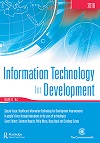ICT4D research: a call for a strong critical approach

ICT for development ( ICT4D) research seeks to examine the social and economic changes in developing countries brought about by the deployment and use of ICT. This intent of ICT4D research parallels that of the critical research paradigm in IS, since both focus on transformation and change. The overall goals of this paper are to( 1)understand the extent of critical research in ICT4Dand ( 2)propose an approach, the“strong critical” approach, to conduct critical research in ICT4D. The proposed approach is based on the writings of two social theorists, Arturo Escobar and Gayatri Spivak, and consists of four concepts– the nature of the post-colonial state, provenience or local history of the ICT phenomena, the influence of the Washington Consensusand the issues of representation and subjectivity of subaltern subjects. A review of ICT4D papers showed that only about 20% follow the critical research approach. In-depth reviews ofeight papers that follow the critical approach showed that the“strong critical” lens can enable a deeper and richer analysis. The main contribution of this paper is in addressing a gap in the ICT4D literature about theorizing in the context of developing countries. The paper also reveals, through in-depth reviews, the value of the strong critical approach.
ICT4D research: a call for a strong critical approach

ICT for development ( ICT4D) research seeks to examine the social and economic changes in developing countries brought about by the deployment and use of ICT. This intent of ICT4D research parallels that of the critical research paradigm in IS, since both focus on transformation and change. The overall goals of this paper are to( 1)understand the extent of critical research in ICT4Dand ( 2)propose an approach, the“strong critical” approach, to conduct critical research in ICT4D. The proposed approach is based on the writings of two social theorists, Arturo Escobar and Gayatri Spivak, and consists of four concepts– the nature of the post-colonial state, provenience or local history of the ICT phenomena, the influence of the Washington Consensusand the issues of representation and subjectivity of subaltern subjects. A review of ICT4D papers showed that only about 20% follow the critical research approach. In-depth reviews ofeight papers that follow the critical approach showed that the“strong critical” lens can enable a deeper and richer analysis. The main contribution of this paper is in addressing a gap in the ICT4D literature about theorizing in the context of developing countries. The paper also reveals, through in-depth reviews, the value of the strong critical approach.
